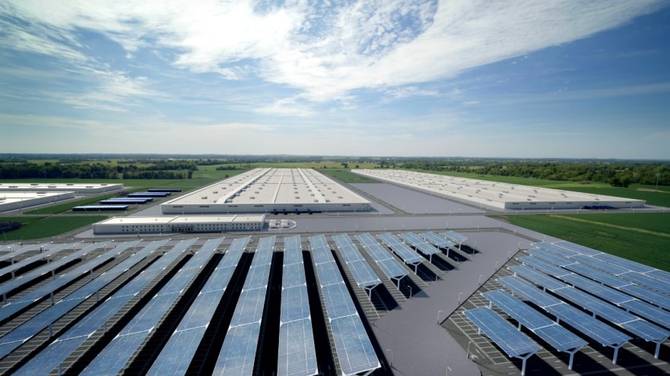Happy Friday. The person who controlled Apple’s storied cash reserves of ~$200 billion just stepped down after a 35-year tenure at the company, Bloomberg reports.
Apple spending spree in 3...2...1...
In today’s edition:
🏗 Lidar for city-planning
🩺 FDA approves a cancer-screening AI
🛻 Ford’s EV battery bulk-up
—Jordan McDonald, Hayden Field, Dan McCarthy
|
|
|
Heritage Images/Getty Images
London city officials are building out a digital version of Harrow, one of the city’s 32 boroughs, and, no, they’re not just tinkering around in SimCity.
They’re creating a digital twin based on lidar, a radar-like tech that builds accurate representations of its surroundings via pulses of light, and which is seen as key technology in enabling autonomous vehicles to “see.”
Until recently, that may not have been an option for city officials in a ~250,000-person city borough—when lidar was first introduced for autonomous vehicles, it cost around $75,000 for a single unit. But lidar has gotten a lot cheaper in recent years, as companies have found economical workarounds like using fewer lasers or cheaper materials.
With that reduction in cost, the 3D-sensor tech can be applied to projects less flashy than autonomous vehicles: like city planning, zoning, and management.
- In August, Harrow officials announced a partnership with Cyclomedia, a mapping company specializing in image capture using lidar-equipped vehicles, and Esri UK, a geographic information systems company, to map the area.
- Harrow officials have started using the tech to plan and monitor projects without as many physical site visits, and Cyclomedia sales manager Fergus Craig said in a late–September public webinar that more pilots are expected across London and the EU in the near future.
Harrow officials used street imagery previously, but the new partnership offers better resolution, greater detail, and more timely and accurate information, allowing for a responsive map called a digital twin—something like an extended, interactive Google Maps.
Digital-twin technology re-creates a physical asset, whether it’s a building, manufacturing plant, or—in this case—an entire borough, using an array of sensor data, images, and software. This gives city planners and engineers the ability to simulate changes, like building a new sidewalk or property, before implementing them in real life.
Looking ahead: Cyclomedia is working on a broader smart London partnership not only with Esri UK, Craig said, but with Bluesky as well—a company that specializes in image-data capture from aircraft.
“High frequency of capture at a low cost is required. So that’s what we’ve developed at Cyclomedia. And that’s what we are going to be piloting around Europe and in the UK between now and the end of the year,” Craig said, in the same webinar. “We have a new system which can be operated by the customer themselves, which will be really good to have a look at in Harrow particularly.”
Click here to read the full story.—JM
|
|
|
Paige
A cancer-diagnosis AI tool received a preliminary green light from the FDA.
Last week, Paige Prostate, an AI-based software for detecting prostate cancer, became the first product of its kind to receive FDA clearance. The software was created by an NYC-based digital diagnostics startup called Paige, which has raised $220 million in funding since its 2018 founding.
Digital diagnostics
The FDA’s decision to grant De Novo clearance came in part after a clinical study in which 16 pathologists used the program to analyze tissue slides—both cancerous and benign—from more than 150 institutions in different regions.
- Paige’s software helped improve cancer detection by more than 7%, Fierce Biotech reported—and decreased both false-negative diagnoses (by 70%) and false-positive diagnoses (by 24%).
Keep in mind: A De Novo clearance is an alternate FDA pathway to classify novel, low- or moderate-risk medical devices. That means there’s “reasonable assurance of safety and effectiveness for the intended use,” even though there’s no “legally marketed” precedent.
- Last year, both Paige’s prostate software and breast-cancer software received CE marks (similar to US FDA approval, but in Europe).
A New York Times report from 2018 noted the company’s “exclusive” relationship with Memorial Sloan Kettering Cancer Center and some of its digital images and diagnostic data. MSKCC disputed some of the claims.
- The cancer center itself, as well as at least one board member, hold an equity stake in Paige.
Big picture: Paige’s FDA clearance is big news for other AI companies that specialize in digital diagnostics, but it raises thorny questions, too. For one, when it comes to training algorithms with medical records, is stripping data of patient identifiers enough? And conversely, does it hold the industry back if and when companies like Paige have exclusive access to critical training data?—HF
|
|
|
|
No longer is futuristic technology just for those of us with aspirations to put a hotel on the moon or drive a car that’s also a submarine.
In fact, most of the smartest tech around is being implemented in consumer products you’d find under the sink, in the garage, or cleaning the floor.
In our latest article, we’re discussing how smart thinking like lidar mapping, AI learning, and ultrasonic tech can make your home life a whole lot better.
This tech is showing up in some surprising places, which means some products that have been around for ages are now officially “smart.”
So take a look at our article and prepare to be floored by all of the upgrades in the consumer tech space.
Check it out here.
|
|
|
Pictured: Concept design of a Kentucky plant; source: Ford
In recent years, Ford has debuted electric versions of its best-selling classics, like the Mustang and the F-150, the nation’s best-selling truck for 44 years running. Its latest EV announcement is much less flashy, but it goes right to the heart of EVs—and could be its most critical yet.
On Monday night, Ford unveiled an $11.4 billion EV investment plan, centered on lithium-ion battery production. SK Innovation, the No. 5 EV battery-maker in the world in terms of market share, is its strategic partner and accounts for $4.3 billion, or ~35%, of the spending.
Why it matters: Ford’s investment, which it says is the biggest manufacturing outlay in its history, will bolster its domestic battery-making capacity ahead of the expected surge in EV sales across this decade. US lawmakers, startups, and analysts have acknowledged a need to reduce reliance on China’s EV battery industry—the country accounts for at least 80% of battery component and materials production, per Bloomberg.
With the $11.4 billion, Ford and SK will build four plants in Kentucky and Tennessee, three of which are focused on battery production and one that is focused on electric truck assembly. Production at the plants is slated to begin in 2025.
-
In total, the plants will produce 129 gigawatt hours (GWh) of battery output annually—enough to power 1 million EVs. For context, the 3 million new EVs that hit the road worldwide last year had 134.5 GWh of battery power total.
-
Ford’s Tennessee plants will use “closed-loop” manufacturing to repurpose battery materials and eventually reduce reliance on mining metals like lithium and cobalt. Enter: new strategic partner Redwood Materials.
Big picture: The bipartisan infrastructure bill, which was dramatically delayed last night, would authorize $6 billion in total funding for the US EV battery industry.—DM
|
|
|
|
Say so long to silos. Intelligent ERP from SAP gives you the visibility and interconnectivity you need to be an efficient, collaborative organization. Just think how much more innovative your teams can be when you break down silos between HR, sales, procurement, finance, IT, and marketing. Learn how you can do business smarter with SAP today.
|
|
|
Unsplash
Stat: Professional meteorologists said DeepMind’s short-term weather-predicting AI model was more accurate and reliable than conventional methods in 89% of compared instances, per a new Nature paper.
Quote: “We’re not actually changing the DNA; that DNA has no impact. It’s not a GMO, it’s not actually changing the plant or the oil or anything. All that we’re doing is putting on this parts-per-billion barcode—they’re just doing it at a molecular level instead of a tag level.”—Jason Warnock, chief revenue officer of cannabis cultivator Flora Growth, on molecular barcodes for cannabis
Read: Market research company Kantar claims its AI tool can predict the impact of an advertisement.
This adds up: Multiple deadlines + pressure for accuracy = stressed accountants. That’s why FloQast’s software was built to help accounting teams operate more efficiently. As former accountants themselves, they’ve developed a few ways to help you decompress after closing the books. Learn more here.*
*This is sponsored advertising content
|
|
-
Google Maps has added a wildfire overlay that works in the same way as its traffic, transit maps, and satellite layers.
-
Nreal, a Chinese AR company, unveiled new AR-equipped sunglasses that it will begin shipping in December in Asia.
-
Akamai, a major content delivery network, dropped $600 million on cloud security firm Guardicore.
-
Chinese regulators released a three-year plan to regulate algorithms.
-
Blue Origin, Jeff Bezos’s space company, is facing allegations from ex-employees that its workplace is “toxic,” “rife with sexism,” and “unsafe.” For its part, Blue Origin says it has zero tolerance for such issues.
-
Correction: In Wednesday’s issue, we mistakenly wrote that Amazon released a smart home hub with GE, which isn’t true. It released a smart thermostat with Honeywell—apologies for the error.
|
|
Three of the following news stories are true, and one...we made up. Can you spot the odd one out?
-
A Mexican village has built around 200 homes with a massive 3D printer.
-
An AI-generated song cracked the Billboard Top 10 this week, courtesy of TikTok.
-
A startup claims it’s building the world’s first “DNA computer.”
-
Honda will build "telepresence robots."
|
|
The US and EU held their inaugural Trade and Technology Council (TTC) meeting this past Wednesday. The group is, in part, intended to help the two develop more unified tech policies.
The TTC has established 10 working groups to focus on issues from export controls to tech and human rights. Two key points below...
-
Semiconductors: The TTC intends to build a partnership to strengthen US–EU semiconductor supply and production, “especially, but not limited to, those with leading-edge capabilities.” Context on that “leading-edge” point—Taiwan-based TSMC currently makes nearly 90% of advanced chips.
-
AI: Each government…“noted”... that the other has proposed or is developing an AI risk framework. The TTC disavowed AI-based social-credit programs, and says it is committed to “responsible” AI development. We’ll be watching the EU’s AI regulation proposal closely over the next few years.
|
|
Catch up on the top Emerging Tech Brew stories from the past few editions:
|
|
|
Enjoying the newsletter? Share it with your network to take advantage of our rewards program.
When you reach 5 referrals, we'll send you this Morning Brew sticker sheet.

Hit the button below to learn more and access your rewards hub.
Click to ShareOr copy & paste your referral link to others:
morningbrew.com/emerging-tech/r/?kid=303a04a9
|
|
|
TikTok has powered smash hits before, but not of AI-generated songs...that we know of.
|
|
|
Written by
Jordan McDonald, Hayden Field, and Dan McCarthy
Was this email forwarded to you? Sign up
here.
|
ADVERTISE
//
CAREERS
//
SHOP
//
FAQ
Update your email preferences or unsubscribe
here.
View our privacy policy
here.
Copyright ©
2021
Morning Brew. All rights reserved.
22 W 19th St, 8th Floor, New York, NY 10011
|
|










